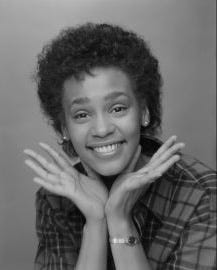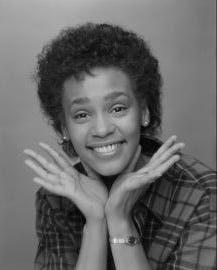"The Voice"
I watched the movie on Whitney Houston’s life yesterday, pausing to look up the real events on YouTube and standing to sing with her, just like I did when I was a teenager. I learned a lot about how to manage breath from Whitney. I sang her songs in the car on the way to record Sun and Sky Blue , because it was a chorus that required tiny sips of breath. Whitney was an absolute master at that. I could not ever have handled the notes she camped out on, in perfect pitch and loud, from only a tiny sip of breath, often tapping her top and bottom lip together while taking that sip. She was incredible in her effortlessness. Her greatest performances still appeared to be spontaneous, unplanned, breezy moments of hearing and feeling music. That’s why she was so mesmerizing, so natural, so spectacular.
“If Only”
It’s fascinating to get older and watch another generation spin this recent cinematic depiction of Whitney’s career and life. They are willing to remain on the surface of the shallow end and let current cultural agendas stitch her story together with present day signals. “If only her family had been able to get through to her” or “if only she felt empowered enough to be openly gay” or “if only those weren’t such racist times.” The truth is, Whitney was one of the last brave souls to focus on the music and let the chatter that the music business pushes about race come second to her devotion to God, and her gift.
It’s humbling to accept that indoctrination, false attitudes, and beliefs reproduce. Either the truth or a lie can intensify with each generation.
Those of us who have researched how ritualistic sexual abuse can produce performing robots and cash cows for the families of multi-talented artists know better than to believe the “official story” of Whitney. Those of us who know the whitewater of recovery from family pathology know better. The culture will coax extreme demonstration of human pain into a box labeled oppression or race or gender, but many of us aren’t buying it anymore.
It’s a Family Affair
Whitney was abusing drugs because of her family, not in spite of them. Her unappealing behavior with Bobbi Brown was icing on a cake that had been baking since adolescence. The official story was that her drug use escalated in the mid 90s, but even hard drugs don’t take a toll on a voice after only a decade. Whitney looked 60 at 45. It was likely that prior to adulthood, she established regular drug use, developing the stamina to handle performing onstage (and in life) under the influence of huge amounts of hard drugs. She was drowning out sexual abuse that her family knew about, and ignored, to keep her performing.
Her father sold her out and was complicit in what led to her death, forcing touring to cover his extravagant losses right when she desperately needed healing. It happens a lot in the entertainment business when offspring are seen for the lucrative phenomenon they have become, instead of a cherished daughter.
I remember meeting a bright and incredible soul many years ago, for a short season. She was a recovering drug addict, and though sober, was struggling financially. She came from an elite, wealthy family. After the loss of her dog grooming business, she was granted an invitation to return to her family’s Idaho ranch, until she got back on her feet. I couldn’t understand why she declined what seemed like a dreamy invitation. She pulled out her passport and asked me to look at the decade-old picture of a strung out woman, staring into an abyss. I hardly recognized her. She looked at me and plainly stated “this is how my family wants me to be. And if I go live there, it’s what will happen. Again.”
Now, it’s important to understand that every member of her family would have vigorously disagreed with that take, while restoring relationship habits, (conscious or unconscious) that could’ve proved it true. Maybe eventually she could’ve overridden it, but she knew herself in sobriety, enough to decline a possible relapse scenario. This is an example of the deeper levels of pathological family dysfunction and addiction. 12 Step groups have formed into neat little categories of the ones who overindulge on substances and the ones who clean it up, but the truth is, all humans are all in need of some level of awareness and pathological recovery.
It is so rudimentary to see an addict and make them the sole problem. It happens all the time. Many people spend an entire lifetime seeking or using a convenient and obvious scapegoat. The truth is, most drug users are feeling, wearing and expressing the pain of at least one family unit and maybe even a generation. Non-users do not want to see their contribution to it, they just want the drug use to end so they can avoid witnessing networks of issues, that they have a part in, stretching out around the drug user. In between the one who gets all the blame and the one who takes all the blame are others who land on a spectrum. Lots of family members could raise their hand and cop to what they covered up, lied about, and manipulated.
If you accept that your only burden is commitment to living according to God’s will, it is easier to stop making another person or situation the burden.
Whitney was an antennae, and a siren, for an entire extended family’s pain and problems. Problems that included multi layered, covert, evil sacrifice and neglect for gain, demanded by an elite industry. Was she really gay, or was her relationship with Robin, her assistant, a safe world in which she could attempt a pathological “second time around?” She may have been seeking victory over sexual abuse by a female relative in childhood. Many people take on the childhood challenge, unconsciously re-running a “crime scene” in adulthood, attempting victory over what once overpowered them. Was she really an addict, or had she learned how to drown out abuse with substances while her brain was still forming, obstructing a path to new tools and solutions in adulthood? Could anyone on the payroll really care during her childhood or adulthood? As much as they cared about getting her out on stage and paid? That was the priority that their actions demonstrated, until her death.
I enjoyed the trip down memory lane through Whitney’s music. After the movie was over, my family had to suffer through my rusty, present day rendition of “I Have Nothing” in the kitchen for the rest of that afternoon. Maybe I was singing to shake off just how much more I sense and know about her story now.
I now critically think through and understand the gaps between the official story and those who produce it. I gratefully decline emotional, denial-riddled groupthink about the world’s greatest talents. I am too curious about possible unknowns and family pathology.
And too suspicious of the systems that sold a fantasy while protecting their interests, eventually wearing and tearing her down.
Just like they’re tryin to do to us.






Loved this blog. I saw this movie. And "saw" what was not shown. Beautifully articulated.